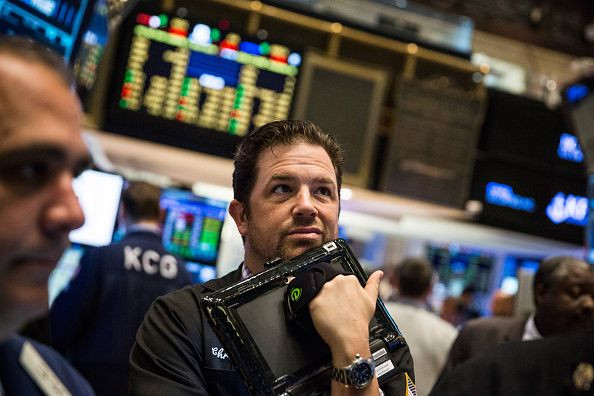Stocks Drop As Oil Prices Fall To A Seven-Year Low

U.S. stocks closed lower Monday as oil prices dipped to their lowest point in nearly seven years, pushing the Standard & Poor's energy index to its biggest one-day loss since August. The Dow Jones Industrial Average fell 117 points, or 0.7 percent, while the S&P 500 lost 15 points, or 0.7 percent, and the Nasdaq composite dropped 40 points, or 0.8 percent.
Brent crude and U.S. crude extended their decline, falling as much as 5 percent, after OPEC's meeting last week failed to address a growing supply glut.
A stronger dollar also made it more expensive to hold crude positions. The dollar rose for a second day and was up against a basket of major currencies.
Oil majors Exxon and Chevron fell about 3 percent and were the biggest drags on the S&P and among the stocks weighing on the Dow.
The S&P materials index fell 2 percent, its steepest fall in three weeks, with Dow Chemicals and DuPont both declining.
The impact of the fall in oil prices offset some of Friday's gains, which were triggered by a strong jobs report.
The solid November employment report showed that the economy was strong enough to absorb an interest rate hike, which is widely expected to occur when the Federal Reserve meets Dec. 15-16.
"The Fed is pretty locked in regarding a hike next week, and any fall in commodity prices will be seen as transitory factors," Art Hogan, chief market strategist at Wunderlich Securities in New York, said.
However, Hogan said a further plunge in oil prices and a stronger dollar could mean subsequent rate hikes will be gradual.
Eight of the 10 major S&P sectors were lower, with the energy index falling 4.1 percent, putting it on track for its biggest single-day decline since the end of August.
Falling oil prices helped airline stocks, with JetBlue Airways up 4 percent and Republic Airways up 2 percent. The S&P 1500 airlines index hit its highest level since January.
Inaccurate forecasts of growth, employment and inflation by the Fed have pulled the central bank in conflicting directions and driven the decision to keep rates low for so long, St. Louis Federal Reserve President James Bullard said.
Traders see a 79 percent chance that the central bank will increase rates for the first time in nearly a decade, according to the CME Group's FedWatch.
Keurig Green Mountain's shares soared 72 percent after the coffee pod maker agreed to be bought for about $13.9 billion.
Office Depot slumped 16 percent after the government said it will vote to block its merger with Staples, which was lost 14 percent.
© Copyright IBTimes 2024. All rights reserved.




















